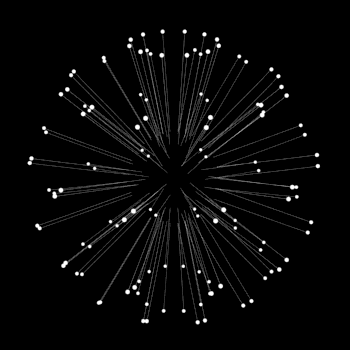The discriminant of a quadratic formula is #b^2-4ac#.
For a number to be odd, #o=2n+1, ninNN#
Using this, we get: #(2b+1)^2-4(2a+1)(2c+1)#
By expanding, we get: #4b^2+b-16ac-8c-8a+5#. No matter what integers you use, you get an irrational number when the quare root is taken.
Proof:
#a=3,b=7,c=-1#
#4(7)^2+4(7)-16(3*-1)-8(-1)-8(3)+5=261#
#sqrt(261)~~16.2#
#a=-5,b=3,c=9#
#4(3)^2+4(3)-16(-5*9)-8(9)-8(-5)+5=741#
#sqrt(261)~~27.2#
Also, #(2n+1)^2+(2n+3)^2=4n^2+4n+1+4n^2+12n+9=8n^2+16n+10#, this would always give an irrational number whenever the answer is square rooted. This can be easily proved, to do this, I will use #3^2+5^2#. I will be using matrices to help represent a square grid.
#[(1,1,1),(1,1,1),(1,1,1)]+[(1,1,1,1,1),(1,1,1,1,1),(1,1,1,1,1),(1,1,1,1,1),(1,1,1,1,1)]#
#=[(1,1,1,1,1,1),(1,1,1,1,1,1),(1,1,1,1,1,1),(1,1,1,1,1,1),(1,1,1,1,1,1),(1,1,1,1,0,0)]#
As you can see, there are two spaces missing.
Though, if the squares of two odd numbers are multiplied together, it still gives a square number, #a^2b^2=(ab)^2#
#(2b+1)^2-4(2a+1)(2c+1)# will give us two new square numbers, but based on the proof with #3^2# and #5^2#, it will give an incomplete square, and therefore an irrational number.
Also, if we take #(2n+1)^2+(2n+3)^2=m^2#
#m^2=8n^2+16n+10#
#8n^2+16n+(10-m^2)=0#
#n=(-16+-sqrt(16^2-4(80-8m^2)))/16#
#n=(-16+-sqrt(-64+32m^2))/16#
No matter what integer you use for #m# as long as it is greater than #sqrt(2)#, #n# will never be a rational number. For #n# to be a rational number, #m=sqrt((64^d+64)/2), dinZZ, d>=2# but #m# will be an irrational number.


